Reviewed by Glenn Erickson
Criterion has reached back to reissue one of its most deserving releases on HD. if commercial considerations came first this show wouldn't have been considered even for DVD release. Leo McCarey's star-challenged 1937 domestic drama is concerned with an utterly un-marketable family issue: what are we to do with aged parents? The Depression-era mass audience went to the movies precisely to escape this kind of problem, dooming Make Way for Tomorrow to a terrible box office take. As reported by critic Gary Giddens on a disc extra, the film received accolades from McCarey's fellow filmmakers and glowing reviews from critics, even if some reviews advised filmgoers that the movie was too sad to be recommended.
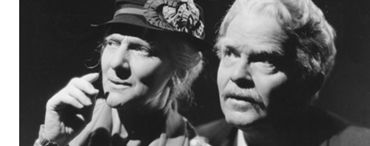
The story is simple enough. When the bank repossesses the house of elderly Bark and Lucy Cooper (Victor Moore & Beulah Bondi), their middle-aged children avoid dealing with the problem. George, the most responsible son (Thomas Mitchell) takes in Ma while the resentful daughter Cora (Elisabeth Risdon) houses Pa. The plan is for the better-off daughter Nellie (Minna Gombell) to eventually take in both parents. Bark and Lucy don't fare well without each other. Cora resents Bark's fussing and is rude to his new friend, the local merchant Max (Maurice Moscovitch). Lucy innocently interferes in George's household, causing friction between his wife Anita (Fay Bainter) and their daughter Rhoda (Barbara Read). When Nellie's husband Harvey (Porter Hall) selfishly refuses to take in either parent, it becomes evident that Bark and Lucy will have to separate permanently. Cora uses a medical excuse to suggest that Bark be sent to another daughter out in California. George looks into an old folk's home for Lucy. After a fifty-year marriage, the old folks are left in Manhattan with just five hours together before Bark's train leaves.
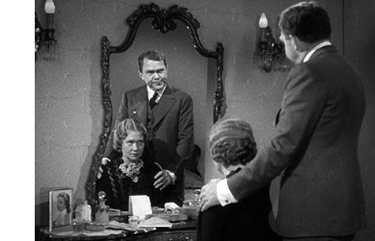
Leo McCarey began his career directing Hollywood's most famous comedians: Laurel & Hardy, Charley Chase, The Marx Brothers, Mae West. He made what many judge to be the best screwball comedy (The Awful Truth) and found his forté in romantic comedy-dramas like Love Affair and Going My Way. Hailed as a master of improvisation, a skill learned from years of silent comedy work, McCarey placed character insight and natural performances above camera tricks. The famed Jean Renoir was famously quoted as saying that no American director understood people as well. Although Make Way for Tomorrow's failure lost McCarey his contract at Paramount, he always considered it his best film.
Viña Delmar's script softens the original book and play yet is relentless in its observation of family dynamics. McCarey doesn't separate his characters into heroes and villains, and his "old folks" are not kindly innocents victimized by unthinking relatives. Dealing with the parents isn't always easy. Old Bark knows he's not welcome in Cora's house and becomes uncooperative. Lucy disrupts Alice's bridge lessons, puts a strain on the duties of the maid (Louise Beavers) and unintentionally contributes to problems with daughter Rhoda. The problem is everyone's fault and no one's; there just seems no place for Bark and Lucy to be together. Even the understanding George and Alice are eventually compelled to take steps to remove mother from the house.
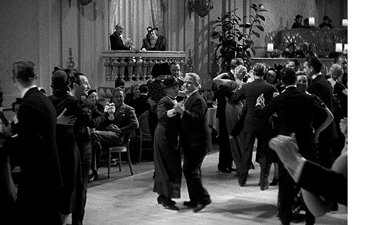
Make Way for Tomorrow does not show its age in the slightest. After an opening title card makes mention of a "generation gap", the movie demonstrates the truth we all know, that 'inconvenient' older relatives can easily be resented. The movie abounds in awkward moments of family embarrassment and thoughtless bad manners. Events that in an ordinary movie would be crucial are only alluded to, as when daughter Rhoda's involvement with an older man ends in talk of her name "being kept out of the case." McCarey is also sensitive to issues often sentimentalized or ignored in 1930s movies. The Coopers' black maid is an employee with rights and needs of her own. When the Jewish merchant Max pays a visit to his friend Bark's sickbed, Cora slams the door in his face, dismissing his wife's chicken soup in a way that smacks of anti-Semitism.
Although Leo McCarey doesn't blunt the reality of the situation he allows the old couple (and us) a last-reel grace period. Left to spend their final afternoon together in the city, Bark and Lucy enjoy an idyllic last date, vaguely reminiscent of the "trip to the city" in Murnau's silent classic Sunrise. The discomfort of their guilty children is forgotten when they visit the hotel where they spent their honeymoon fifty years before. The hatcheck girl is gracious and the manager treats them to the hospitality of the house. Lucy has a drink, but only after observing that
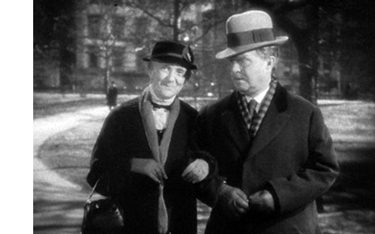 other women are drinking in public now. For a couple of hours Bark and Lucy are able to communicate as sweethearts once more. What follows is one of the most devastatingly touching farewells in the movies.
other women are drinking in public now. For a couple of hours Bark and Lucy are able to communicate as sweethearts once more. What follows is one of the most devastatingly touching farewells in the movies.
For such an emotional subject, no tears are shed. Make Way for Tomorrow addresses a hard truth of old age without playing the tragedy game, and its heartbreak is honestly earned. We are told that Paramount chief Adolph Zukor pleaded with Leo McCarey to relent and allow his ill-fated couple to stay together, but the director had too much integrity to undercut his story. At this point in his career McCarey was so consistently successful that a "flop" of this caliber only added to his prestige.
The movie demonstrates the talent of character actress Beulah Bondi, who gives one of the best and most understated performances of the 1930s. Also earning our respect is actor Thomas Mitchell as the only relative willing to assume responsibility for his parents. In a tellingly painful moment, Lucy spares her son the pain of turning her out by making an announcement of her own. The sense of sacrifice involved has an almost Biblical quality, played out in a humble everyday setting.

The Criterion Collection's Blu-ray of Make Way for Tomorrow is essentially the same as their DVD from 2010, with the expected sharper resolution and added stability. The uncompressed track makes the track slightly more impactful when played through a larger sound system. The clear image allows us to admire the impressive makeup work on the actors. Beulah Bondi wasn't yet fifty, and the illusion of old age is remarkable.
The disc extras begin with two interviews. Critic Gary Giddens examines Make Way for Tomorrow in the context of the 1930s, when Social Security had just been adopted. He also explains director McCarey's relationship to the HUAC committee hearings and the problems of his later career. Peter Bogdanovich relates anecdotes told him by greats like Howard Hawks and Orson Welles, assembling a warm picture of McCarey as one of Hollywood's most respected talents.
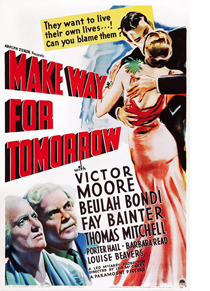
An insert booklet contains three insightful essays. Bertrand Tavernier writes about discovering the film later in France. An excerpt from Robin Wood analyzes Make Way for Tomorrow's final date scene as an act of "un-marrying" between two adults facing the end of their relationship. Critic Tad Gallagher's appreciation of Leo McCarey's deceptively unforced direction uses telling frame grabs to illustrate subtle, relevant meanings in the images.
The extras inadvertently bring up an inconsistency. Essayist Tag Gallagher identifies Make Way for Tomorrow screenwriter Viña Delmar as a pen name for a male screenwriter, Eugene Delmar. Peter Bogdanovich relates a story about an attractive woman catching Leo McCarey's eye at a nightspot; McCarey subsequently interviewed Ms. Delmar sight unseen and was surprised to discover it was the same person. Other sources identify the Delmars as a married couple who worked together on scripts. Her birth name was Alvina Croter, which might explain the odd Spanish pen name. However, when Eugene died in 1956, Ms. Delmar also stopped writing.
When shown Make Way for Tomorrow at film school, most of us were devastated. Professor Robert Epstein wasn't lying when he told us that the ad campaign for the film completely lied about its contents. I've included a good example here. The tagline says, "They want to live their own lives...! Can you blame them?" Most of will assume that the 'they' being referred to are the stylish couple kissing on a dance floor... who have no relation to the film. The style of the dress rules out the idea that Bark and Lucy are regarding younger versions of themselves -- McCarey's picture is severely glamour-challenged.
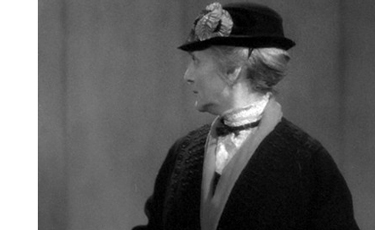
On a scale of Excellent, Good, Fair, and Poor,
Make Way for Tomorrow Blu-ray
rates:
Movie: Excellent
Video: Excellent
Sound: Excellent (uncompressed monaural)
Supplements: Tomorrow, Yesterday, and Today (2009), an interview featurette with filmmaker Peter Bogdanovich; 2009 interview with Gary Giddins; booklet with essays by Tag Gallagher and Bertrand Tavernier, and an excerpt from a Robin Wood essay.
Deaf and Hearing-impaired Friendly?
YES; Subtitles: English
Packaging: Keep case
Reviewed: May 3, 2015

Text © Copyright 2015 Glenn Erickson
See more exclusive reviews on the Savant Main Page.
The version of this review on the Savant main site has additional images, footnotes and credits information, and may be updated and annotated with reader input and graphics.
Return to Top of Page
|

